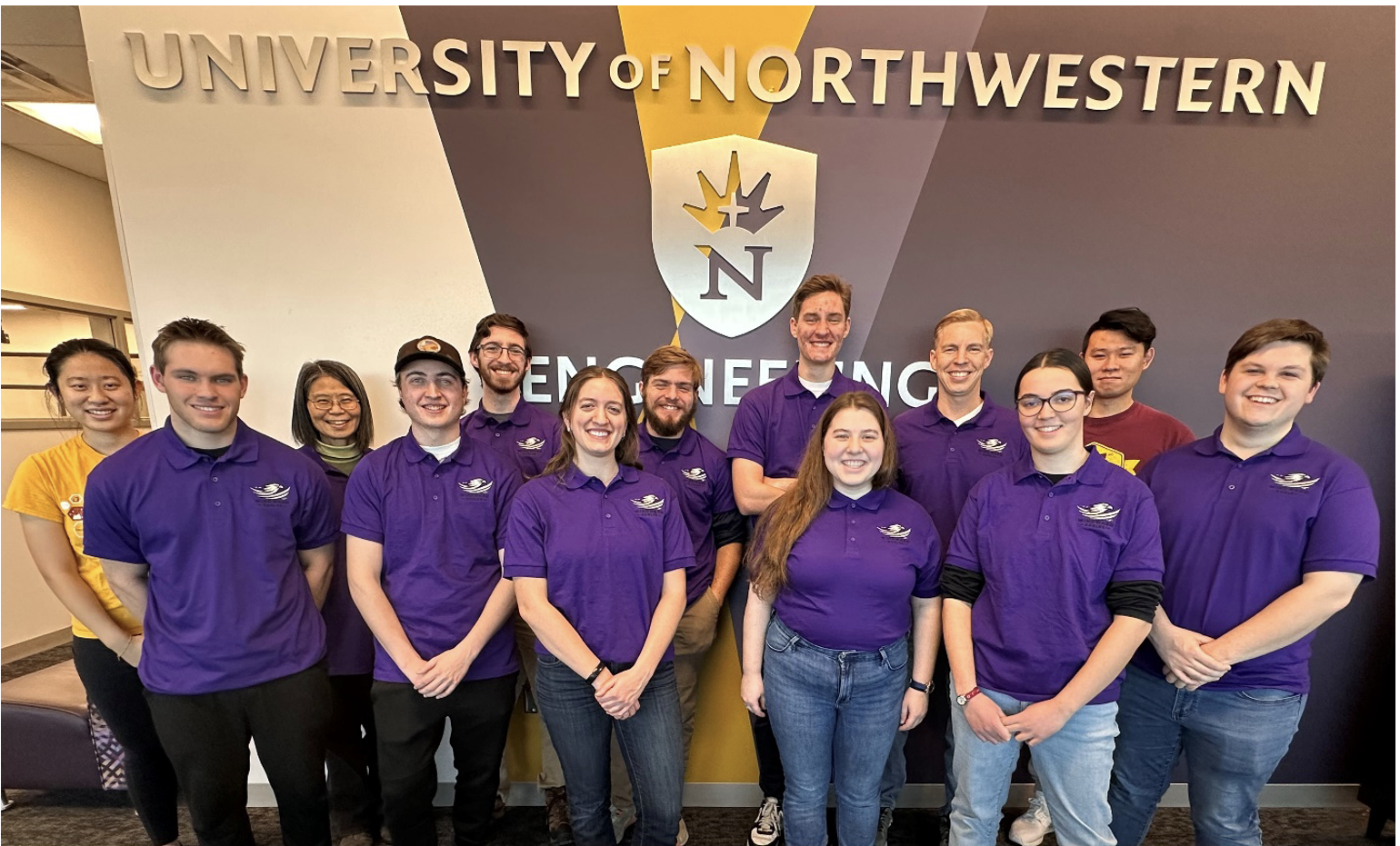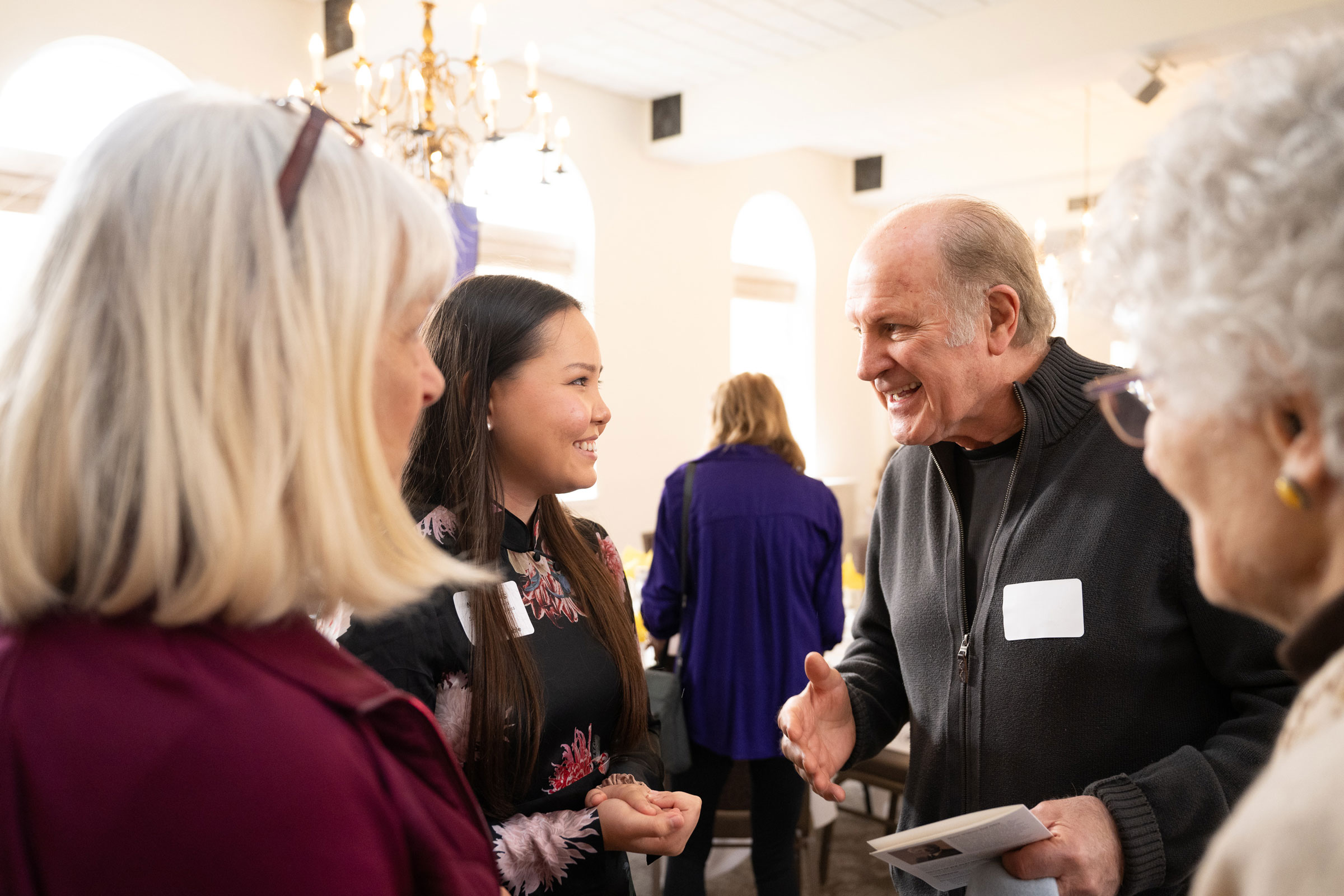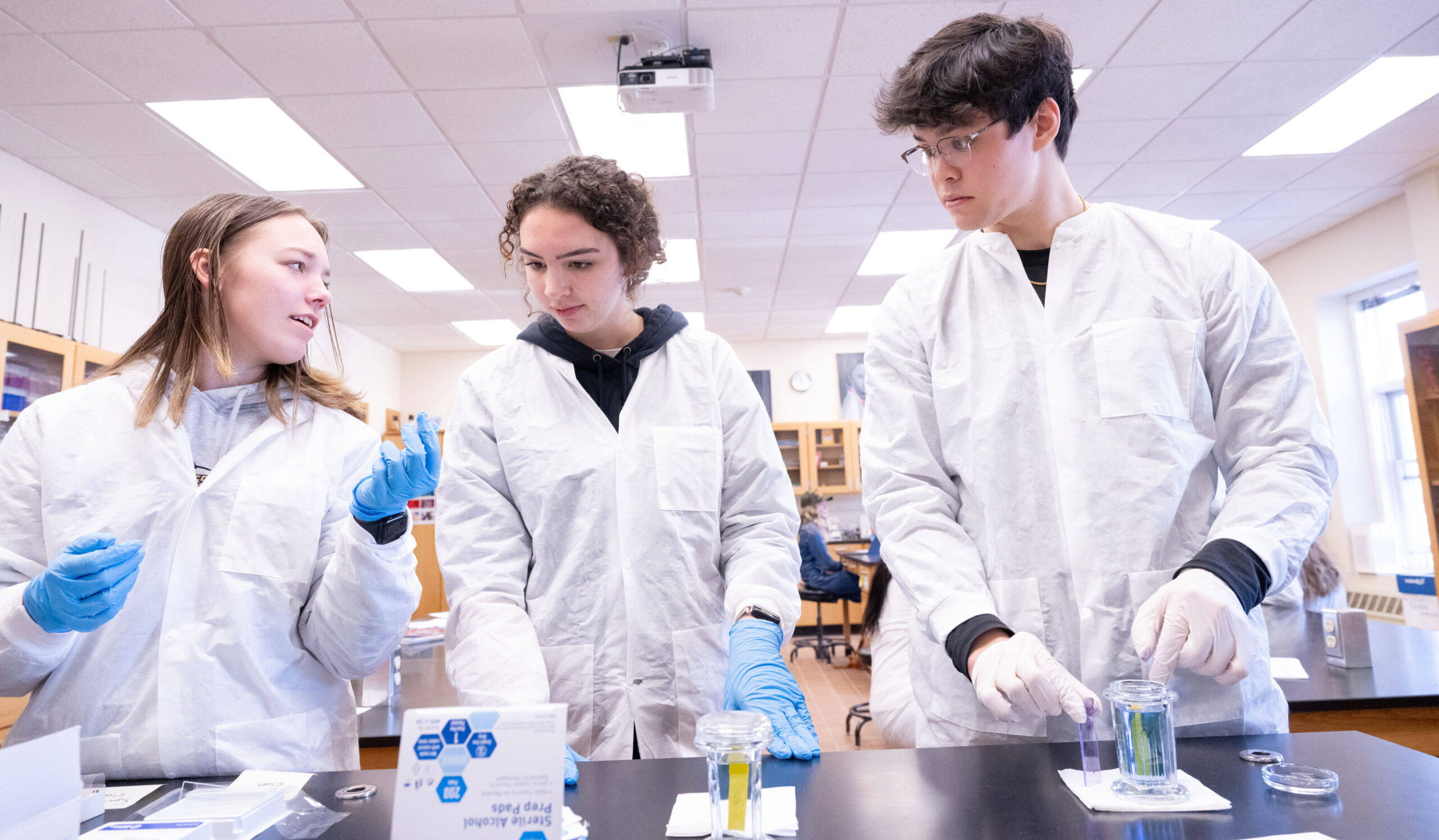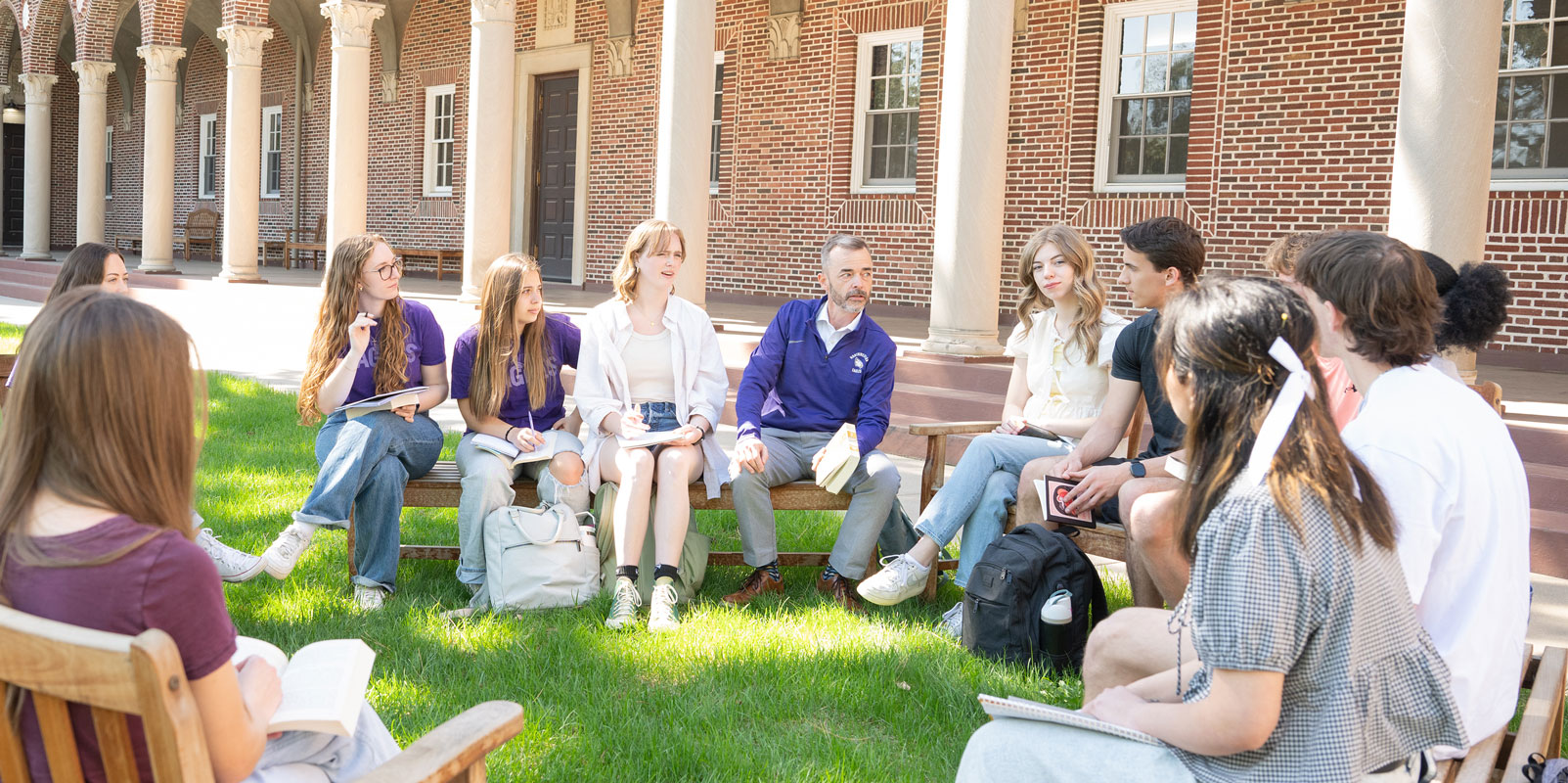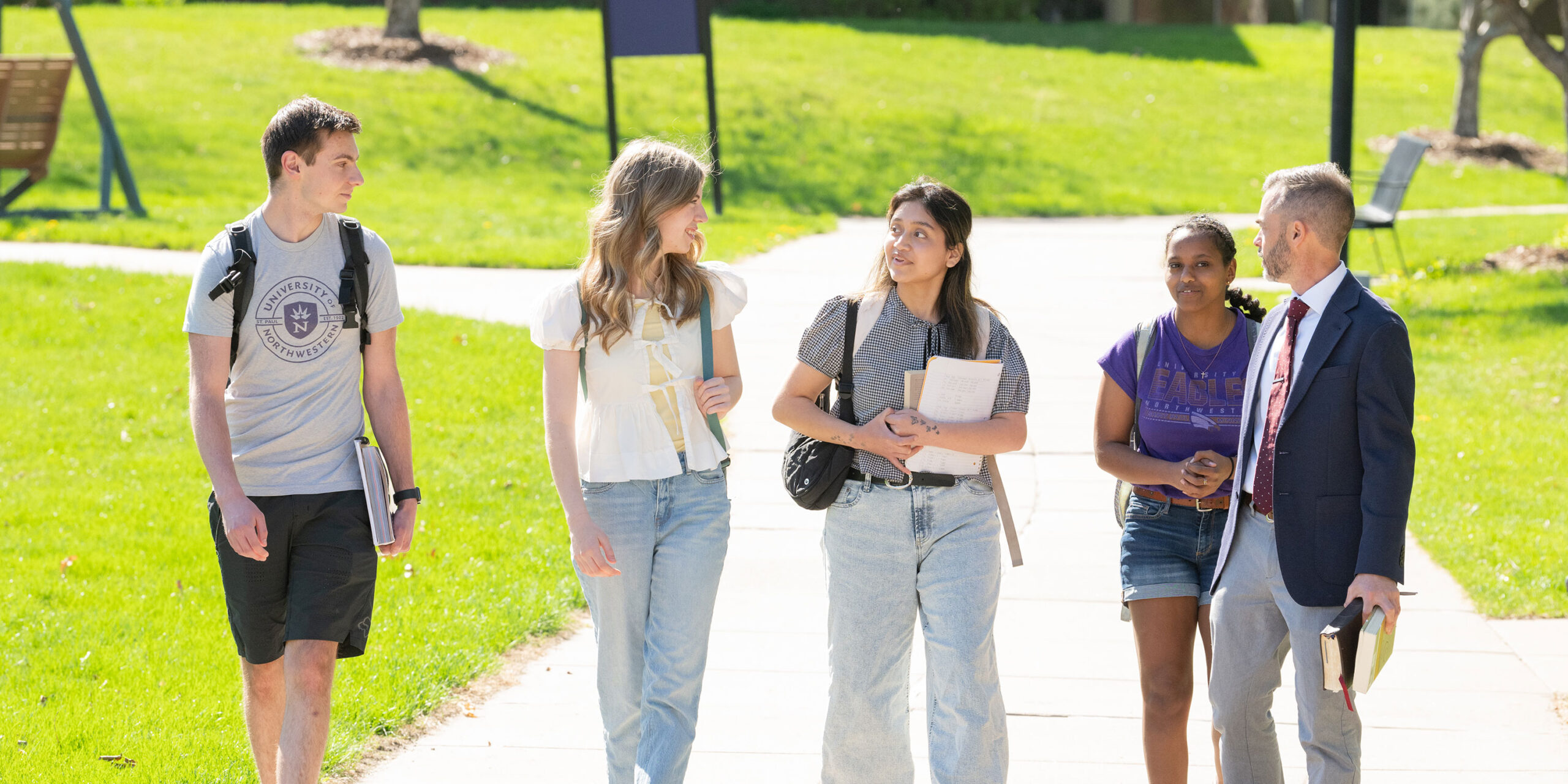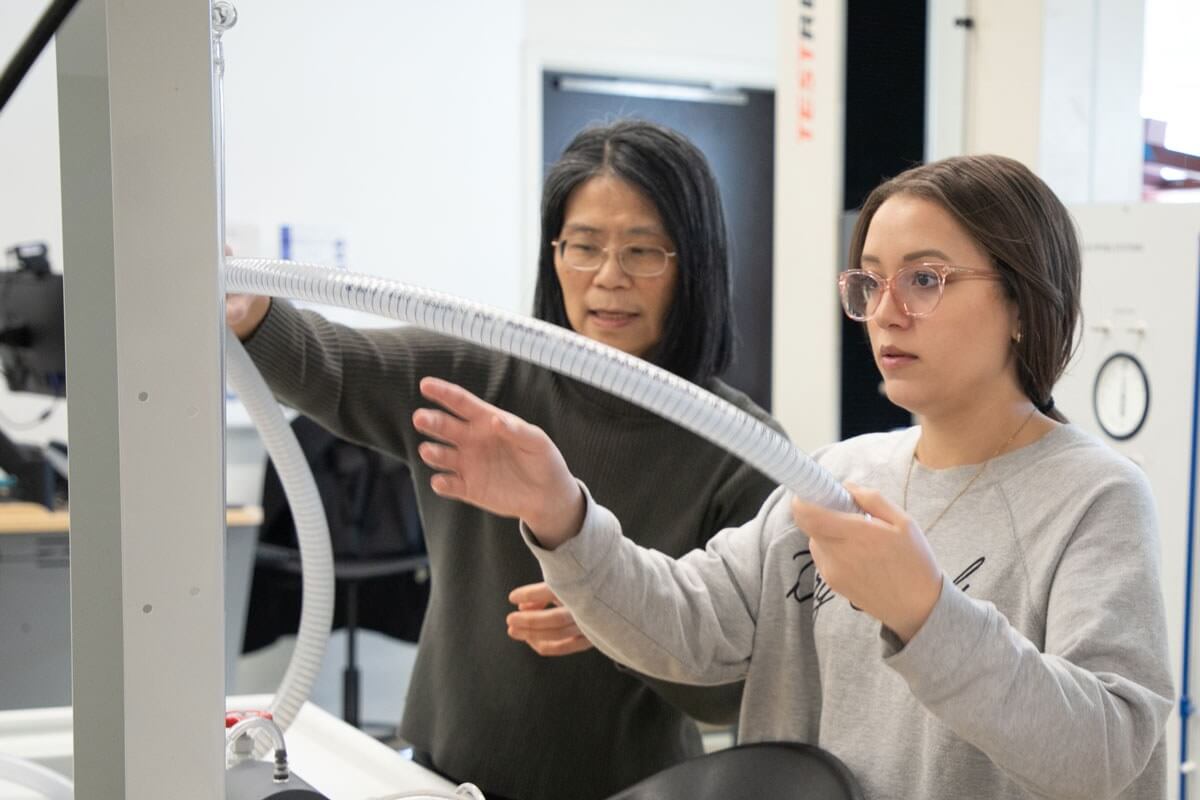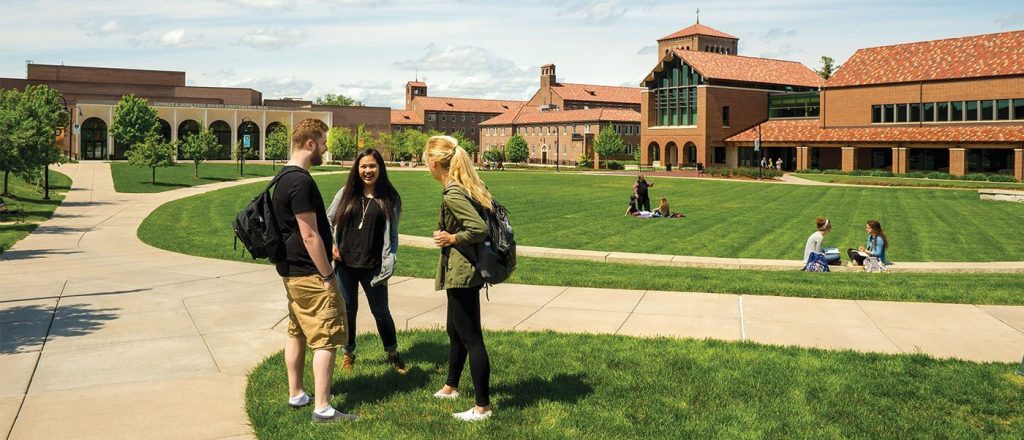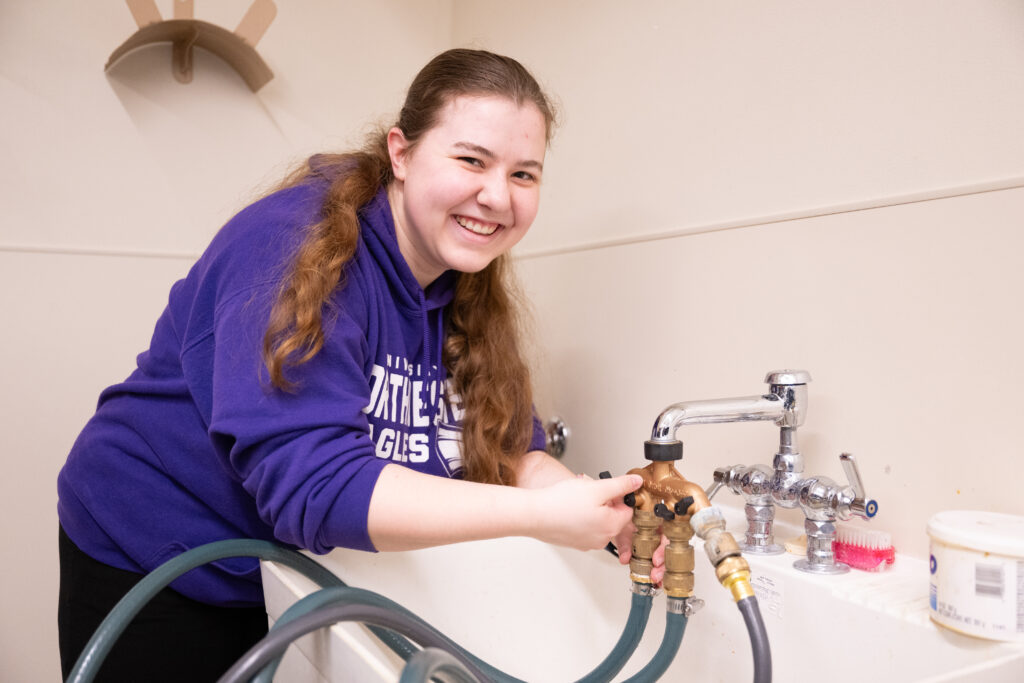ST. PAUL, Minn., May 20, 2025 – University of Northwestern – St. Paul (UNW) is pleased to announce the hiring of Dr. Clinton Collister to the faculty of the Classical Christian Honors College (CCHC). Dr. Collister previously served as Research Associate at the Centre for Theology, Law, and Culture at Oxford University where he lectured on theology and literature. Introduced last summer, the CCHC features a curriculum that consists of unique honors courses each semester, allowing students to pursue a second major in Great Books & Ideas. Students will engage with timeless texts and explore questions about life, faith, and leadership – all in small, discussion-based classes.
“We are thrilled that Dr. Collister will be joining our faculty,” said Dr. Ryan Griffith, Dean of the Classical Christian Honors College. “He exemplifies the kind of faculty we hope to attract – brilliant and humble, convictional and gracious, an expert who is also an avid learner – a wonderful combination of gifts for forming students for all of the Christian life.”
“I admire how Northwestern aims to help students to know truth, goodness, and beauty while preparing for their future professions,” said Collister. “I am eager to contribute to this exciting program and to work alongside the faculty and staff.”
Dr. Collister holds a BA in Literature from Valparaiso University (IN), a MA in English Literature from Oakland University (MI), a MLitt from the University of St. Andrews, and a PhD in Theology and Literature from Cambridge University. His research interests include theological anthropology and the writings of C.S. Lewis and T.S. Eliot. With his wife, Sarah, Collister co-founded Little Gidding Press, where he serves as Editor-in-Chief. He is also ordinand for the priesthood in the Anglican Church of North America. Starting this August, Collister will join the faculty full time as Assistant Professor of Theology & Great Books.
You can find out more about UNW and the Classical Christian Honors College by visiting unwsp.edu/cchc.
###
University of Northwestern – St. Paul (UNW) is a nondenominational, Christian university in St. Paul, Minn. With a Biblical worldview integrated into all programs, UNW provides a unique educational experience for students who want to combine faith and education. Northwestern offers more than 50 areas of study, including five master’s degrees, and online and early college programs. Northwestern Media, a ministry of the university, owns and operates 105 radio signals throughout the Midwest across 13 states with a total listenership of more than 2 million listeners. Visit unwsp.edu for more information.
Every fall, new students arrive on University of Northwestern – St. Paul’s campus filled with hopes, questions, and prayers. Some students come with a clear vision for their future, while others are still searching. Either way, one thing unites them, and that’s the fact that they are stepping into a Christ-centered community that is committed to helping them grow in wisdom, leadership, and faith.
In many cases, the thing that makes that possible is the generosity of donors.
For many students, scholarships are not just a financial tool; they can be a life-changing gift. They give students room to dream bigger, focus harder, and graduate on a more stable foundation. Scholarships are often the reason a student is able to attend Northwestern at all.
Recent graduate Isaiah Hitz (Class of 2024) was one of the students that benefited from a donor-created endowed scholarship. “I was extremely grateful when I found out that I had received this scholarship,” Isaiah shared with us. “I had been unsure if I would be able to complete the semester without going into significant debt.”
Donors who give to student scholarships, especially through endowed funds, are investing in more than a student’s tuition. They’re investing in transformation.
After becoming a Christian in high school, Isaiah felt God showing him the world’s need for more missionaries. While at Northwestern, Isaiah had the opportunity to study abroad in Tokyo, Japan, and he now feels called to pursue ministry abroad. About his endowed scholarship, Isaiah told us that, “This financial gift will enable me to jump into seminary more quickly to prepare to spread the gospel message.”
The best thing about endowed scholarships is that they are structured to last forever in that the original donation is invested and preserved, while the interest made by that investment supports students year after year. That means that a donor’s gift doesn’t just help one student. Over time, it supports dozens of students like Isaiah who are growing into leaders who will shape culture and serve Christ in every field imaginable.
If you’ve already given to scholarships at Northwestern, thank you. Your generosity is creating ripple effects which you may never fully see this side of Heaven.
If you’re considering giving, or even starting an endowed scholarship, we’d love to talk with you about the impact you could have.
If you’re a parent wondering what kind of support your student would receive at Northwestern, know that we care deeply about your student, not just academically, but spiritually and personally. Our financial aid packages are designed to work hand-in-hand with generous scholarship support, and we walk alongside each family to explore every option.
Scholarships aren’t just about dollars. They’re about doors opened. Dreams realized. Callings confirmed.
And that’s what our donors make possible.
“I would want the people who made my scholarships possible to know that they are a much bigger blessing to college students than they realize,” Isaiah told us. “To our generous donors, thank you for supporting Northwestern students who are being prepared to minister to others in a world that needs His light.”
Whether you give $100 or create an endowed fund that lasts generations, your gift matters. It matters to students like Isaiah. It matters to families praying for provision. And it matters to the mission of shaping Christ-centered leaders in a world that desperately needs them.
The Center for Innovation and Research (NCIR) at the University of Northwestern – St. Paul, in collaboration with the School of Science and Engineering, is now offering its inaugural Summer Research Program focused on biomedical technologies.
Covering all major categories of biomedical technologies—and extending into emerging areas—the 2025 program includes research topics such as biomaterials, biomedical devices (e.g., stents), biosensors, assistive robotics, healthcare solutions, and pharmaceutical applications. Faculty-proposed projects will be carried out over the summer with active student participation.
This inaugural program serves as a springboard for collaborative research and as a catalyst for fostering a culture of innovation, helping to accelerate the university’s transition into a research and innovation-driven culture. Through industry partnerships, Northwestern continues to expand the reach and relevance of the NCIR as a growing force in science and engineering.
The NCIR exists to partner with Minnesota industries and opens doors for student experience in collaborative research and development led by experts in their field. Students benefit from the NCIR as it unlocks exclusive potential for internships, projects, and resume building opportunities. These real-world connections give students a competitive edge, allowing them to graduate ahead of their peers with relevant experience in a growing field. Northwestern develops leaders in innovation and entrepreneurship, setting graduates up for long-term success.
To inquire about a project, email [email protected] and inquire about a class project or Senior Capstone.
Without question, large-language-model artificial intelligence (like OpenAi’s ChatGPT) is transforming the way we work and live. In an era when many are already questioning the value of a liberal arts education, is AI making it a thing of the past?
The answer may surprise you. Here are three reasons why the age of artificial intelligence demands a robust liberal arts education:
1. AI Is Only as Good as Its Inputs (and Sometimes Much Worse)
Without question, large-language-model artificial intelligence (like OpenAi’s ChatGPT) is transforming the way we work and live. In an era when many are already questioning the value of a liberal arts education, is AI making it a thing of the past?
AI can analyze data and generate responses, but it is only as good as its inputs. Even the best AI has limits – it can only (legally) analyze public source material or licensed resources. High-quality resources like copyrighted works and peer-reviewed research are usually out of its reach. As many users have discovered, AI occasionally generates false responses (hallucination). And what is worse, sometimes even makes up sources to support its claims. To make the best use of AI, the marketplace needs well-read men and women who know how to source claims, understand arguments, and make wise judgements grounded in reality.
2. AI Cannot Reason Rightly
Because of its remarkably natural language, we can be tempted to think that AI is capable of reason – to form judgments by considering various options and choosing the wisest answer. But understanding the rules of logic does not qualify AI to make judgements – especially when it comes to moral or ethical reasoning. This kind of reasoning is a distinctly human function. It requires evaluating a set of (often complex) circumstances though a coherent understanding of reality—an understanding that makes sense of existence, nature, knowledge, and purpose. This understanding ultimately comes through a heart transformed by the Holy Spirit, submitted to the Lordship of Christ, and oriented to God’s truth as it is revealed in Scripture and displayed in the created order. That’s why a liberal arts education, grounded in truth, is essential for the workplace and world. Our homes, churches, communities, and workplaces need leaders who understand competing truth claims and can point to what is true, good, and beautiful.
3. AI Can Serve or Enslave
Technology is not neutral. It can serve or it can enslave. At present, it is often easier to see the benefits of AI than its disadvantages – but there are always tradeoffs. AI will help medical professionals discover disease earlier and propose more effective treatment. But AI will also enable bad actors to manipulate and defraud the vulnerable. Some will use AI to enhance knowledge and grow in learning and wisdom. Others will use it as a substitute for learning and pass off its results as their own work. The marketplace needs individuals who can make wise use of technology – to use AI to help human beings be more fully what God has designed them to be, rather than enslaving them to their disordered desires. Christ-centered liberal arts education forms students to become who they are in Christ. It aims to help students, by God’s grace, order their affections rightly – training their moral imagination and forming habits of heart and mind. It does this by reflecting on Scripture and profound thinkers across the centuries who have wrestled with the most important questions of life.
Artificial intelligence does not spell the end of liberal arts education; it emphasizes its critical importance. Technologies are instruments and their impact on the world depends on who designs them and whose hands they are in. We need liberal arts education grounded in pursuit of Truth to ensure that technologies help us become more fully human – now more than ever.
Interested in learning more about a transformative liberal arts education? Northwestern’s Classical Christian Honors College provides a cohort-based, seminar-style secondary major in the great books and ideas that complements a student’s primary area of study. The unique program satisfies most of a student’s core curriculum requirements, allowing students to complete two majors without adding time or cost to their education.
Do not forget to do good and to share with others, for by so doing you will lay up a great treasure for yourselves. —Hebrews 13:16
Many of the students at University of Northwestern – St. Paul have a story to share about the power of scholarships. Generous donors continue to be the bridge that makes a way for students to walk these campus hallwaysas full-time. UNW students—students who are quick to recognize that God heard their prayers and provided for them in very practical, tangible ways: through the hands of others who share a heart for Northwestern and have a desire to make a difference in the lives of the next generation.
Many of the students who have chosen to make Northwestern their home away from home would not have been able to do so without the support from donors. Because of their unwavering commitment to students, our institution is filled with growing leaders who truly want to be here and recognize the value of their Christ-centered education and community.
Here’s What Some of Our Current Students Have to Say About the Impact of Scholarships:
I was super surprised and extremely thankful to God when I found out I had been blessed with this scholarship. I had been feeling overwhelmed about how I’m going to pay for college by myself. My family doesn’t have much money, and they are not able to support me financially. I can’t thank you enough. God bless you. —L. Frost
I feel so blessed to have received a scholarship this year. It really means the world to me! I have had to work very hard to be able to afford this school, and I don’t receive any financial help aside from scholarships. —B. Greenberg
Because of the scholarships I have received, I am able to continue to attend Northwestern, an incredible Christian university that I have been blessed to experience. It is amazing to be surrounded by a Christian community filled with professors, friends, and coaches who love the Lord and pour into others tremendously. Without scholarships like this, I would not have been able to have this experience. Thank you! —H. Merseberger
Abigail’s Story
From the time Abigail was little, it was a dream of hers to attend University of Northwestern – St. Paul (UNW). 98.5 KTIS, a station under the Northwestern Media brand (an entity of Northwestern), was always on in the two places she spent a large majority of her time: in their home and in the car. She would often hear commercials about UNW and from an early age, became certain that this would one day be her school.
Her parents knew of her strong desire to pursue her undergraduate degree at Northwestern but didn’t have the financial resources to help Abigail pay for this Christ-centered undergraduate experience. Abigail spoke candidly about this reality, “Even though Northwestern has been my dream school for forever, I kinda never thought it would be a possibility… my dad is a teacher, and my mom is a stay-at home mom so I always knew there was no college fund.”
Like many students who attend Northwestern, committing to this private Christian college was a dream that became a reality because generous donors made a way for her. She and her parents are thankful for the many who have chosen to use their resources so that more students are able to attend Northwestern. We share with them the understanding that it is a privilege to be a part of our students’ personal and educational journeys as they become more grounded in Christ’s unwavering love and His call for them to amplify the gospel in their homes, churches, communities, and world.
Take a minute to watch her story.
Interested in directly impacting students through scholarships?
Giving to the Northwestern Scholarship Fund is one-way students can receive financial support. Another is setting up a scholarship; the donor can determine the name and criteria for the scholarship they are funding either annually or through an endowment. If you are interested in learning more, our Advancement Team is ready to answer your questions.
On behalf of the many students who have received a scholarship, thank you to our donors. Your partnership continues to be the bridge for many who go on to impact others for Christ in their spheres of influence, using the degree they’ve earned along with the gifts and talents God graciously lavished on each of them for His glory.
ST. PAUL, Minn., March 11, 2025 – To meet the growing demand for skilled professionals in biomedical technology, University of Northwestern – St. Paul is expanding its engineering programs to include the addition of the Bachelor of Science in Mechanical Engineering (BSME) degree and a Chemical Engineering concentration.
Due to the significant interest in the Mechanical Engineering concentration within UNW’s ABET accredited Engineering degree, the expansion into a BSME is a logical next step for UNW’s program. “Mechanical engineering is one of the top in-demand fields, with applications across aerospace, robotics, manufacturing, energy, and specially Minnesota’s thriving medical device industry” says Dr. Siu-Yue Tam. “Our new BSME program equips students with a strong technical foundation while integrating a Christ-centered approach to innovation and ethical leadership. Graduates are prepared to excel in cutting-edge industries that drive technological advancements and improve lives.”
Due to strong student and industry demand, we are introducing a concentration in Chemical Engineering, making Northwestern the only private university in Minnesota to offer this option. This concentration joins our existing concentrations in Electrical and Civil Engineering, allowing students to specialize in critical areas of engineering. The Chemical Engineering concentration prepares graduates for careers in the energy industry, microelectronic production, biomedical technology, and environmental sustainability, which are all high-impact industries.
Northwestern is also pleased to share updates on the Northwestern Center for Industrial Research (NCIR) which launched in January. NCIR is serving the local industry and contributing to the regional ecosystem for economic and technological growth. Currently, the NCIR is partnering with two startup companies on projects including testing application accuracy and efficiency as well as creating systems to help engineers manage and optimize complex systems.
By driving external industrial partnerships and fostering internal collaboration, NCIR is strengthening its focus on medical devices, advanced manufacturing, and sustainable engineering. Through these efforts, NCIR is helping bridge the gap between academia and industry, providing students with internship and job placement opportunities, ensuring they gain real-world experience and career pathways in high-demand fields.
Dr. Janet Sommers, Northwestern’s Provost, commented, “The addition of these two programs was an organic, yet strategic choice for Northwestern. We are well prepared, both in our ideal location in Minnesota’s Medical Alley and with our STEM program expansion, to equip future leaders to succeed in this industry.”
###
University of Northwestern – St. Paul (UNW) is a nondenominational, Christian university in St. Paul, Minn. With a biblical worldview integrated into all programs, UNW provides a unique educational experience for students who want to combine faith and education. Northwestern offers more than 65 areas of study, including seven master’s degrees, and online and early college programs. Northwestern Media, a ministry of the university, owns and operates 29 Christian radio stations throughout the Midwest with a total listenership of more than 2 million listeners. Visit unwsp.edu for more information.
Classical education prioritizes deep learning through discussion-based courses. Small class sizes led by faculty mentors emphasize student engagement and provide an exciting, thought-provoking environment. This approach encourages problem-solving, robust conversation, analytical thinking, and ethical reasoning. Research shows that students who have learned in this environment are better prepared for personal and professional success. [1] More importantly, this way of learning equips us to pursue our calling as Christians (Romans 12:1-4).
Graduates of a Christ-centered classical program are differentiated from their peers in at least five key ways:
1. Intellectual Agility & Critical Thinking:
Engaging in discussion challenges students to use higher level thinking, analyzing what they encounter and articulating what they discover to their classmates. Discussions help students grapple with alternative perspectives, cultivating the ability to consider and respond to ideas in real time. These skills fuel our joyful obedience to the Great Command (Mark 12:29-31) and provide real-world application and value. [2]
2. Emotional Intelligence:
Christian classical education prioritizes personal and spiritual formation, not simply intellectual development. Discussions frequently reveal opposing perspectives, challenging students to cultivate self-awareness, emotional regulation, understanding, and effective communication. Students also learn how to couple courage in conviction with sympathy in feeling and courtesy in speech. Not only are these valuable soft skills for the workplace, they reflect a person’s ongoing sanctification (Colossians 3:12-17; 1 Peter 3:13).
3. Confidence & Leadership Development:
Research demonstrates that discussion-based programs enhance verbal and written communication skills. [3] Cohort models (where students progress through a series of courses, together) provide students the opportunity to improve along others whom they will grow to know and trust. Grounded in a biblical understanding of identity (Galatians 2:20), students learn to how to present ideas persuasively, engage with different viewpoints, respond to failure, navigate group dynamics, lead discussions, and delegate authority—critical skills for all of life.
4. Broad-based learning:
The diverse subject matter represented in a theologically-oriented, liberal arts Great Books curriculum exposes students to a variety of disciplines – economics, psychology, literature, biology, physics, philosophy. This not only fuels worship (Psalm 111:1-2), it provides students the opportunity to make connections across fields and approach problems with greater insight. Such broad-based learning is increasingly valuable in today’s quickly changing, hyper-specialized workforce. [4]
5. Adaptability:
Automation and artificial intelligence are reshaping industries in countless ways. Classical education equips students as life-long learners, enabling them to re-skill and transcend specific job functions. More importantly, it challenges students to consider the nature and ends of technology, equipping them to make wise and ethical use of innovation in an increasingly complex world.
The Classical Christian Honors College provides these benefits while allowing students to pursue any of UNW’s more than 50 areas of study. Our Great Books & Ideas program is a unique way of satisfying most of UNW’s core curriculum requirements. This allows you to earn a highly marketable, honors-transcripted, 40-credit second major alongside nursing, engineering, biology or any other degree of your choice.
Want to earn unique skills for the marketplace? Space is limited! Apply today.
[1] Ling Li, “Reskilling and Upskilling the Future-ready Workforce for Industry 4.0 and Beyond.” Information Systems Frontiers 26, (2024): 1697–1712. Accessed Feb 17, 2025, https://doi.org/10.1007/s10796-022-10308-y
[2] Ibid. See Table 1.
[3] Jay R Howard, Discussion in the College Classroom. (Hoboken, NJ: Wiley, 2015), 6.
[4] Ling Li, “Reskilling and Upskilling, ” Accessed Feb 17, 2025, https://doi.org/10.1007/s10796-022-10308-y
The University of Northwestern (UNW), long celebrated as a Christian teaching institution, is embarking on an exciting new chapter in its history. With the launch of the Northwestern Center for Innovation and Research (NCIR), UNW is embracing a dual identity that emphasizes both academic instruction and value-driven research. This transformation is not just a shift in focus; it is a new step toward redefining the university’s role in shaping the future.
The NCIR is a multidisciplinary hub advancing industry innovation and technology through collaborative research and development. Organizations can work with the NCIR for product development and process improvement. The center offers support to help businesses succeed. Whether the company is large or small, and regardless of where they are on their innovation journey, the NCIR can tailor to specific needs.
NCIR represents a commitment to excellence and innovation, rooted in UNW’s Christian values. The center seeks to form strong, lasting partnerships with industry leaders to address real-world challenges, create impactful solutions, and provide students with ample opportunities to grow. In its short time since establishment, NCIR has already established connections with numerous companies, initiated research projects, and positioned itself as a hub for collaboration and discovery. By integrating research with teaching, UNW is not only preparing students for meaningful careers but also contributing to advancements that align with its mission to serve others and glorify God.
Collaboration lies at the heart of NCIR’s mission. The center fosters partnerships not only between UNW and industry leaders but also within the university itself. NCIR supports projects that connect faculty and students from various fields. This helps participants develop a valuable skill for the future. This skill is the ability to work well in a diverse team. In a world where innovation increasingly depends on collective efforts, NCIR is ensuring that students learn to thrive in collaborative environments, both academically and professionally.
Real-World Impact through Community Partnership
Community partnerships connect academic theory with real-world practice. They give students a chance to tackle real challenges faced by businesses, both big and small. Through these partnerships, NCIR fosters a dynamic learning environment where students do not just study problems—they solve them.
One recent project came from a start-up company. The aim was to improve a project management tool. This tool is made for design engineers who work with complex equipment. This is a cutting-edge technology that gives students a front row look intotechnology development with the satisfaction of contributing to a dynamic ecosystem of technological advancement and job creation.
Outside of providing solutions to organizational needs, the NCIR also opens doors for UNW students. Andrew, a current Engineering student, is just one example. Despite months of searching, he was unable to secure an internship with his dream company. After connecting with NCIR, Andrew quickly got an internship that fit his goals. He was given hands-on experience and the connections he needed to succeed in his field.
This year, our students achieved a milestone by qualifying for the first round of the Department of Energy’s prestigious Wind Competition. The challenge? To design and build a prototype for an offshore floating wind turbine farm. UNW is one of only 35 teams nationwide to qualify, earning prize money to test and build their innovative prototype. Achievements like this showcase the caliber of opportunities our students can access.
Student Opportunities at UNW and NCIR
One of NCIR’s primary goals is to provide students with hands-on learning experiences that extend beyond traditional classroom settings. Collaborating with leading companies in STEM fields, particularly in the medical device sector, students can:
- Engage in Class Projects: Work on assignments that solve problems for industry partners. Use what you learn in class to tackle real-world issues.
- Complete Senior Capstone Projects: Undertake year-long projects sponsored by companies, gaining valuable insights into professional workflows and expectations.
- Secure Internships: Benefit from NCIR’s connections with industry leaders to land internships that offer practical experience and mentorship.
- Build Career Opportunities: Leverage NCIR’s network to connect with employers who value the rigor and values-driven education provided by UNW.
- Develop Problem-Solving Skills: Engage in industrial projects that hone their abilities to think critically, innovate, and tackle complex challenges. These experiences prepare students to become not only effective professionals but also forward-thinking innovators and entrepreneurs.
Benefits for Students and Their Families
For prospective students, choosing a university is a significant decision. At UNW, we’re committed to making that choice easier by offering an experience that combines academic excellence, practical skills, and spiritual growth. Here are some key benefits NCIR provides:
Partnering for the Future
NCIR’s mission is to form lasting partnerships with industry leaders who share our commitment to innovation and excellence. These collaborations not only benefit students but also enhance the university’s ability to impact the broader community. By working together, NCIR and its partners can drive advancements in technology, healthcare, and more—all while glorifying God through their efforts. Within the university, NCIR promotes collaboration among departments, creating a vibrant ecosystem where faculty and students from different disciplines unite to tackle complex challenges and share knowledge.
Join Us at UNW and NCIR
The Northwestern Center for Innovation and Research is more than just a research center; it’s a launching pad for success. Whether you’re a student eager to make a difference or a parent seeking the best for your child, NCIR offers a pathway to growth, opportunity, and faith-driven achievement.
We invite you to learn more about NCIR and see how it can transform your educational journey. Visit our website, schedule a campus tour, or connect with us directly to explore all that UNW and NCIR have to offer. Together, we can build a future rooted in faith, guided by excellence, and dedicated to service.
